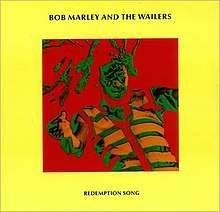Redemption Song
"Redemption Song" is a song by Bob Marley. It is the final track on Bob Marley and the Wailers' twelfth album, Uprising, produced by Chris Blackwell and released by Island Records.[2] The song is considered one of Marley's greatest works. Some key lyrics derived from a speech given by the Pan-Africanist orator Marcus Garvey entitled "The Work That Has Been Done".[3]
| "Redemption Song" | |
|---|---|
 | |
| Single by Bob Marley and the Wailers | |
| from the album Uprising | |
| B-side |
|
| Released | October 1980[1] |
| Genre | Folk |
| Length | 3:49 |
| Label | Island/Tuff Gong |
| Songwriter(s) | Bob Marley |
| Producer(s) | Bob Marley, Chris Blackwell |
At the time he wrote the song, circa 1979, Bob Marley had been diagnosed with the cancer in his toe that took his life a couple years later. According to Rita Marley, "he was already secretly in a lot of pain and dealt with his own mortality, a feature that is clearly apparent in the album, particularly in this song".
Unlike most of Bob Marley's other tracks, it is strictly a solo acoustic recording, consisting of his singing and playing an acoustic guitar, without accompaniment. The song is in the key of G major.
"Redemption Song" was released as a single in the UK and France in October 1980, and included a full band rendering of the song. This version has since been included as a bonus track on the 2001 reissue of Uprising, as well as on the 2001 compilation One Love: The Very Best of Bob Marley & The Wailers. Although in live performances the full band was used for the song, the solo recorded performance remains the take most familiar to listeners.
In 2004, Rolling Stone placed the song at #66 among "The 500 Greatest Songs of All Time". In 2010, the New Statesman listed it as one of the Top 20 Political Songs.[4]
On February 5, 2020 (on the eve of what would have been his 75th birthday) Marley's estate released an official animated video for the song.[5] This also commemorated the 40th anniversary of the song's release.
Personnel
Bob Marley – vocals, acoustic guitar, production
With Bob accompanying himself on Guitar, "Redemption Song" was unlike anything he had ever recorded: an acoustic ballad, without any hint of reggae rhythm. In message and sound it recalled Bob Dylan. Biographer Timothy White called it an 'acoustic spiritual' and another biographer, Stephen Davis, pointed out the song was a 'total departure', a deeply personal verse sung to the bright-sounding acoustic strumming of Bob's Ovation Adamas guitar.
— James Henke, author of Marley Legend[6]
Meaning and influence
The song urges listeners to "Emancipate yourself from mental slavery," because "None but ourselves can free our minds." These lines were taken from a speech given by Marcus Garvey at Menelik Hall in Sydney, Nova Scotia, during October 1937 and published in his Black Man magazine:[7][8]
We are going to emancipate ourselves from mental slavery because whilst others might free the body, none but ourselves can free the mind. Mind is your only ruler, sovereign. The man who is not able to develop and use his mind is bound to be the slave of the other man who uses his mind ...[9]
In 2009, Jamaican poet and broadcaster Mutabaruka chose "Redemption Song" as the most influential recording in Jamaican music history.[10]
In 2017 "Redemption Song" was featured in series 25 of BBC Radio 4's Soul Music, a documentary series exploring famous pieces of music and their emotional appeal, with contributors including Marley's art director Neville Garrick, Jamaican Poet Laureate Lorna Goodison, Grammy Award-winning artist John Legend, and Wailers guitarist Don Kinsey.[11]
Covers
Joe Strummer of The Clash recorded a cover of this song that was released posthumously on the album Streetcore in 2003, which featured his backing band at the time, The Mescaleros.
References
- Strong, M. C. (1995). The Great Rock Discography. Edinburgh: Canongate Books Ltd. p. 518. ISBN 0-86241-385-0.
- Hagerman, Brent (February 2005). "Chris Blackwell: Savvy Svengali". Exclaim.ca. Archived from the original on 27 April 2012. Retrieved 29 December 2010.
- Davis, Henrietta. "Emancipate yourselves from mental slavery: The origin and meaning behind Bob Marley's Redemption song". Henrietta Vinton Davis' Weblog. Retrieved 22 March 2016.
- Smith, Ian K. (25 March 2010). "Top 20 Political Songs: Redemption Song". New Statesman. Retrieved 25 March 2010.
- France, Lisa Respers. "New 'Redemption Song' video celebrates Bob Marley's 75th". CNN. Retrieved 2020-02-15.
- James Henke, Marley Legend: An Illustrated Life of Bob Marley, Tuff Gong Books, 2006, ISBN 0-8118-5036-6, p. 54.
- Black Man, Vol. 3, no. 10 (July 1938), pp. 7–11
- "Shunpiking Online Edition Black History Supplement 2005 . Marcus Garvey and Nova Scotia". www.shunpiking.org.
- The Marcus Garvey and Universal Negro Improvement Association Papers, Vol. VII: November 1927–August 1940; ISBN 978-0-520-07208-4. Marcus Garvey, author; Robert A. Hill and Barbara Bair (eds), p. 791.
- Cooke, Mel (6 August 2009). "Mutabaruka's 50 most influential Jamaican recordings - Tosh, Marley dominate top 10". Jamaica Gleaner. Archived from the original on 12 August 2011. Retrieved 18 July 2011.
- "Redemption Song", Series 25, Soul Music, BBC Radio 4.